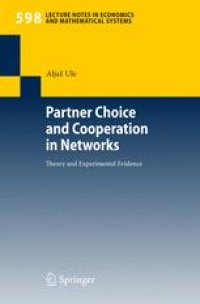
Ebook: Partner Choice and Cooperation in Networks: Theory and Experimental Evidence
Author: Dr. Aljaž Ule (auth.)
- Tags: Game Theory/Mathematical Methods, Behavioural Sciences, Economic Theory, Microeconomics, Game Theory Economics Social and Behav. Sciences, Sociology
- Series: Lecture Notes in Economics and Mathematical Systems 598
- Year: 2008
- Publisher: Springer-Verlag Berlin Heidelberg
- Edition: 1
- Language: English
- pdf
Cooperation is beneficial but may be hard to achieve in situations where the selfish interests of individuals conflict with their common goal, such as in sharing of goods, help, knowledge or information, in trade and pollution negotiations, and in exploitation of common resources. The standard models of such "social dilemmas" assume that the individuals are obliged to participate in the dilemma. These models fail to capture an important element of human interaction: that people are in general free to select their interaction partners. In this book a social dilemma with partner selection is introduced and studied with the methods of formal game theory, experimental economics and computer simulations. It allows exploration of simultaneous dynamics of the network structure and cooperative behavior on this structure. The results of this study show that partner choice strongly facilitates cooperation and leads to networks where free-riders are likely to be excluded.
Cooperation is beneficial but may be hard to achieve in situations where the selfish interests of individuals conflict with their common goal, such as in sharing of goods, help, knowledge or information, in trade and pollution negotiations, and in exploitation of common resources. The standard models of such social dilemmas assume that the individuals are obliged to participate in the dilemma. These models fail to capture an important element of human interaction: that people are in general free to select their interaction partners.
In this book, a social dilemma with partner selection is introduced and studied with the methods of formal game theory, experimental economics and computer simulations. It allows exploration of simultaneous dynamics of the network structure and cooperative behavior on this structure. The results of this study show that partner choice strongly facilitates cooperation and leads to networks where free-riders are likely to be excluded.
Cooperation is beneficial but may be hard to achieve in situations where the selfish interests of individuals conflict with their common goal, such as in sharing of goods, help, knowledge or information, in trade and pollution negotiations, and in exploitation of common resources. The standard models of such social dilemmas assume that the individuals are obliged to participate in the dilemma. These models fail to capture an important element of human interaction: that people are in general free to select their interaction partners.
In this book, a social dilemma with partner selection is introduced and studied with the methods of formal game theory, experimental economics and computer simulations. It allows exploration of simultaneous dynamics of the network structure and cooperative behavior on this structure. The results of this study show that partner choice strongly facilitates cooperation and leads to networks where free-riders are likely to be excluded.
Content:
Front Matter....Pages I-X
Motivation and Outline....Pages 1-6
Basic Concepts of the Theories of Games, Networks and Markov Chains....Pages 7-25
The Network Dilemma Game....Pages 27-33
Cooperation in Finitely Repeated Network Dilemma Games....Pages 35-75
Exclusion and Cooperation in Experiments....Pages 77-115
Dynamics of Partner Choice and Cooperation....Pages 117-168
Back Matter....Pages 169-202
Cooperation is beneficial but may be hard to achieve in situations where the selfish interests of individuals conflict with their common goal, such as in sharing of goods, help, knowledge or information, in trade and pollution negotiations, and in exploitation of common resources. The standard models of such social dilemmas assume that the individuals are obliged to participate in the dilemma. These models fail to capture an important element of human interaction: that people are in general free to select their interaction partners.
In this book, a social dilemma with partner selection is introduced and studied with the methods of formal game theory, experimental economics and computer simulations. It allows exploration of simultaneous dynamics of the network structure and cooperative behavior on this structure. The results of this study show that partner choice strongly facilitates cooperation and leads to networks where free-riders are likely to be excluded.
Content:
Front Matter....Pages I-X
Motivation and Outline....Pages 1-6
Basic Concepts of the Theories of Games, Networks and Markov Chains....Pages 7-25
The Network Dilemma Game....Pages 27-33
Cooperation in Finitely Repeated Network Dilemma Games....Pages 35-75
Exclusion and Cooperation in Experiments....Pages 77-115
Dynamics of Partner Choice and Cooperation....Pages 117-168
Back Matter....Pages 169-202
....